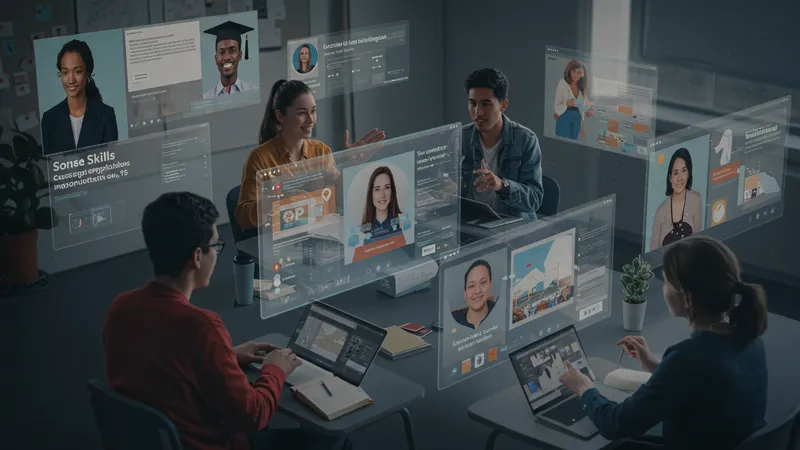

Did you know that online training platforms could soon replace traditional education? The rapid growth of digital learning tools is transforming how we acquire skills and knowledge. Platforms like Coursera and Udemy are at the forefront of this revolution.
As remote work becomes a staple of modern career paths, the demand for flexible learning has skyrocketed. Employers and learners alike are turning to online platforms to stay competitive. This trend is no longer just a passing fad; it could redefine the future of learning.
You might assume these platforms are simply convenient alternatives to traditional education, but they offer far more than that. The scope of subjects, from data science to holistic wellness, is astounding. And their dynamic, on-demand format allows learners to fit education into their hectic lives. But that’s not even the wildest part…
The adoption rate of these platforms is staggering. Businesses now integrate online training into their employee development programs, allowing them to upgrade skills swiftly. In this landscape, digital literacy isn't optional—it's imperative. But dig deeper, and you'll find even more startling truths…
What happens next shocked even the experts. This evolution isn't just reshaping industries; it's sparking debates about the very fabric of education itself. Is your mindset ready for the shift? There’s more intrigue on the horizon…
At first glance, online training platforms seem like a financial dream. Courses are often cheaper than traditional education, offering substantial savings. However, hidden costs lurk beneath the surface that could take learners by surprise. It’s not uncommon for additional fees to appear for certificates or advanced courses, making the total expenditure unexpectedly high.

Moreover, the requirement of supplementary materials, such as specific software or textbooks, can add up. Many users find themselves spending nearly as much as they would have in a conventional classroom setting. But there’s one more twist to consider about the true financial commitment.
Time is a currency often overlooked. The self-paced nature of online learning can tempt procrastination, leading to longer completion times. For some, this indirect 'cost' may outweigh the monetary savings, as extending study timelines could delay career advancements.
The potential distractions of a home environment can also impact the effectiveness of self-led training. This might require further investment in creating a conducive learning space. What you read next might change how you see online training platforms forever.
It might sound paradoxical, but online learning platforms are forging tight-knit communities. These platforms often feature forums, study groups, and peer reviews, creating an interactive and supportive learning environment. For many users, this sense of community surpasses what they experienced in physical classrooms.

And remarkably, learners aren’t just networking with peers. Many platforms allow direct interactions with instructors, offering a personalized educational experience that students in overcrowded lecture halls might envy. The access to global perspectives is another advantage too frequently overlooked.
There are community events held virtually, from hackathons to group discussions, that further the learning experience. Surprisingly, these platforms offer a diverse group of like-minded individuals that enhance the learning journey in unanticipated ways.
These social bonds and academic collaborations extend far beyond the confinements of the platform, sometimes resulting in life-long friendships and professional networks. But this is merely scraping the surface—what comes next might transform your entire perspective on education.
Traditional educational institutions are no strangers to the pressures exerted by the rise of online training platforms. Universities and colleges worldwide are exploring collaborations or offering their own online programs to retain students. This shift marks a significant evolution in educational delivery models.

For some students, the hybrid model offers the best of both worlds—combining the thoroughness of a traditional curriculum with the flexibility of online learning. However, it also creates a competitive environment where institutions must innovate, sometimes rapidly altering longstanding pedagogical methods.
Moreover, online platforms may catalyze a necessary shift in focus from mere degree attainment to practical, skills-based outcomes. This change is catalyzed by employers appreciating skill proficiency over formal qualifications, a trend becoming evident across numerous industries.
Such changes provoke continuous conversations regarding the efficacy and future of traditional education. Are communities ready for such a paradigm shift? The answers might surprise you. Another intriguing facet of this educational revolution awaits you right around the corner.
As more employers adopt online training platforms, the motivations driving this shift reveal fascinating insights. It’s not merely about cost-cutting or convenience. The ability to tailor learning pathways to specific skill gaps means employees become proficient more swiftly and efficiently.

Furthermore, the promise of on-demand learning translates to a more adaptable workforce. Employees who engage with online learning resources tend to be more innovative and eager to take on new challenges, thus creating a culture of continuous improvement within organizations.
Another hidden advantage is the democratization of educational access. Online platforms flatten hierarchies, allowing junior staff to upskill on par with seasoned colleagues, fostering an inclusive and empowering work environment.
Companies investing in their employees' growth via these platforms often see increased loyalty and engagement. But just when you think you’ve grasped all the implications, further layers of complexity come into play. This is merely a peek into the broader societal ripple effects rapidly emerging.
One might assume that younger, tech-savvy individuals dominate the demographic of online learners, but the reality is more nuanced. A growing number of older professionals are turning to online training platforms to remain competitive in changing job markets.

In addition, geographic barriers have nearly dissolved, allowing people from remote regions to access world-class education. This democratization is transforming opportunities for many, enabling learners from diverse backgrounds to advance.
Another unexpected trend is the involvement of part-time learners who juggle careers, families, and other responsibilities. These platforms provide unparalleled flexibility, accommodating unconventional schedules while maintaining rigorous academic standards.
The inclusivity of these platforms isn't confined to age, location, or schedule. Diverse cultural perspectives contribute to a richer learning environment. But does this expansive reach come with unintended consequences? The upcoming sections hold the answers.
Search engine optimization, or SEO, is playing an increasingly pivotal role in online education platforms' visibility and success. With crowded markets, platforms are vying for attention by deploying sophisticated SEO tactics to rise to the top of search results.

This isn't merely about keyword stuffing; it's about informed content creation that meets specific learner needs. Platforms are investing in market research to pinpoint precisely what topics and queries resonate with their target demographic, ensuring their content aligns with users' educational intents.
Furthermore, personalized recommendations spam fewer searches, allowing students to seamlessly transition from one course to the next, driven by algorithms that understand their learning patterns.
However, these strategies restore focus on educational quality and learner outcomes rather than superficial metrics. The implications of SEO extend far beyond visibility into shaping the quality of educational content delivered—its deeper impact is something worth exploring further.
In the hard-technical world of online learning, the rise in demand for softer skills like emotional intelligence and communication may seem counterintuitive. However, studies highlight a rising tide of learners looking to refine these essential interpersonal abilities.

This aligns with employer expectations, who stress that technical proficiency is incomplete without strong soft skills, as these define workplace culture and operational effectiveness. Platforms are thus ramping up course offerings in areas more focused on personal development.
Interestingly, this is inspiring a shift in the traditional 'soft skills' category, with creative problem-solving and adaptability now at the forefront. The question lies in how well these platforms adjust to these changing tides, ensuring their offerings evolve accordingly.
The challenge remains—few predict the next wave of soft skills demanded by industries. The dynamics of this topic show that this remains an area of vibrant evolution, where expectations are perpetually recalibrated. Are you ready for more revealing insights?
Artificial Intelligence is increasingly making its mark in education, from providing real-time feedback to crafting personalized learning experiences. These advancements might represent the future of online learning platforms.

AI technologies can adaptively tailor educational experiences based on learner performance, ensuring a tailored pace that standard classrooms could never achieve. This will inevitably bridge gaps traditional methods cannot cater to effectively.
Further afield, AI proffers essay grading, comprehension tests, and recommendations for improvement. The promise of instant, impartial grading allows learners to understand their progress and optimize their study routines.
But are there risks of over-reliance on algorithms to determine educational direction? As AI continues to morph the learning landscape, this raises crucial ethical questions about the role of humanity in education. Stay with us as we explore these complexities thoroughly.
While online learning platforms boast innovative advantages, they spark critical ethical debates. Privacy concerns around data collection and student tracking are at the forefront of discussions surrounding these platforms.
There’s also the shadow of inequality—those without high-speed internet access or the latest technology might lag, exacerbating the digital divide. Certain socio-economic groups face challenges accessing these platforms, requiring thoughtful solutions to bridge these gaps.
Moreover, the debate over the authenticity and recognition of online qualifications continues. There’s skepticism about the real-world application of credentials obtained digitally, affecting perceptions among employers.
Balancing innovation with ethical practice involves difficult decisions, but there’s hope for equitable solutions. Your understanding of this issue might shift once you realize all its dimensions as we delve deeper.
Gamification—an unlikely hero in education—is enhancing online learning platforms, making learning more engaging, interactive, and fun. Incorporating game design elements like scoreboards, points, and badges drives motivation remarkably well.

These tools transform mundane learning tasks into competitive or collaborative adventures, improving learner engagement through spirited rivalry or team dynamics. It’s a surprisingly effective strategy to foster sustained interest and deeper learning.
Furthermore, gamification encourages experimentation and perseverance. When learners see learning as a game, trial and error become less daunting, making the learning environment more resilient to failure.
It might sound revolutionarily playful, but some question its impact on intrinsic motivation. Will learners start valuing the game more than the knowledge itself? The unfolding narrative of gamified learning proves these questions deserve our attention for more insights.
Surprising as it might be, influencers are steadily playing a role in shaping educational trends. Popular figures on social media platforms can inspire a massive uptake in courses or influence interest areas, potentially steering educational focus.

They provide powerful endorsements for particular platforms or courses, tapping into audiences’ trustworthiness built over time. This phenomenon brings education into realms previously unimaginable, marking a transformation in educational marketing.
This practice isn’t inherently flawless; it often raises questions of credibility or accuracy. Are influencers genuinely experts, or are credibility endorsements driven by financial incentives?
The narrative remains complex, yet compelling, illustrating how interconnected our media ecosystems have become. The dimension of influencers has added another layer to educational landscapes infusing them with dynamic and vibrant possibilities. More on this awaits in succeeding sections.
As online learning continues to reshape education, traditional campuses face existential questions. Brick-and-mortar institutions must redefine their value propositions to remain relevant.

Blended learning is one approach; integrating online components into traditional courses offers exceptional flexibility and expanded resources. But the deeper inquiry centers on how physical campuses evolve to sustain their relevance.
Campuses may morph into hubs of innovation and networking. Supplementing pure academia with rich social experiences, career networking, and cultural enrichment might be a thriving path forward.
Traditional campuses aren't being phased out; they're adapting to a digital age. This transition represents a collaboration rather than a competition, a partnership in learning's future. With an eye on tomorrow, explore how traditions and innovations find coexistence seamlessly.
One subtle yet critical conversation around online learning platforms concerns their environmental impact. The transition from physical classrooms to digital interfaces offers potential eco-benefits.

Gone are the days of commuting to classes, reducing the carbon footprint remarkably. Lower demands for physical infrastructure also contribute positively, presenting a somewhat sustainable path toward education.
However, digital energy consumption remains a point of concern. Data centers, network infrastructures, and personal devices collectively demand significant energy resources, challenging assumptions of environmental friendliness.
As we navigate these factors, the vision of building a greener digital learning space emerges. As you proceed, the significance of environmentally conscious educational practices becomes ever more pressing.
One of the most remarkable outcomes that digital learning platforms offer is the opportunity for cross-cultural exchanges. Enabling students from disparate regions to engage with each other fosters a uniquely global classroom.

This intersection of cultures facilitates profound learning benefits, offering insights into diverse perspectives and nurturing understanding and tolerance among students.
However, fostering cross-cultural dialogue isn’t without complexities. Identifying effective communication strategies that transcend language barriers remains a nuanced challenge.
The impact of such amalgamations can be transformative, creating environments ripe for cultural education. The path forward is intriguing, mixing diversity and inclusion, and this vibrant potential landscape awaits your exploration.
In the digital learning world, microcredentials represent uncharted waters of potential, offering bite-sized yet recognized qualifications in specific knowledge areas.

Short yet intensive courses grant learners an opportunity to master skills without investing heavily in extended degree programs, creating opportunities to build and credentialize specific skills effectively.
While many institutions have yet to embrace this trend, the practical advantages appeal greatly across industries seeking validated competencies over traditional qualifications.
Yet, are learners and institutions truly prepared for a shift? The ongoing dialogue surrounding acceptance and recognition will likely shape the path of microcredentials. The stakes are unprecedented; grasp this unfolding narrative in all its possibilities.
The journey through the transformative world of online training platforms reveals a profound shift influencing all aspects of education. From rethinking methods of delivery to tackling ethical questions, their impact is vast and growing.

The digital age of learning is like no other revolution. With endless possibilities, platforms redefine education, challenging barriers and opening global access unprecedentedly.
These revelations compel us to view learning through a holistic lens—embracing technology while adhering to ethical responsibility. We are part of a fascinating era; how we navigate it will define future generations.
Share this article with friends, bookmark it for reference, and together, let’s embrace the exciting evolution of education. Dive into these discoveries and educate others—our collective future depends on our readiness to evolve.